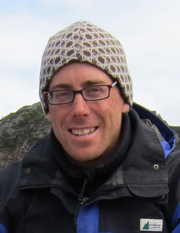ABC7 Features Shark Tracking Research of Professor Christopher Clark
September 24, 2012Underwater robots are now tracking sharks and transmitting data to marine scientists, thanks to a team of researchers led by Harvey Mudd College engineering Professor Christopher Clark; California State University, Long Beach biological science Professor Christopher Lowe; and University of Delaware biological science Professor Mark Moline.
More than 10 student researchers have contributed to the project, including HMC physics major Chris Gage ’13. ABC7 will air a report on the project Monday, Sept. 24, at 11:15 p.m. PST.
The new shark tracking technology allows scientists to follow sharks across longer distances and for longer time periods of time, as well as report on the sharks’ environment, providing information about the factors that may influence their migration patterns.
The tracking system uses multiple autonomous underwater vehicles, or AUVs, equipped with sensors designed to receive signals from an acoustic-emitter tag attached to the shark. Based on the tag’s time of arrival and signal strength data, the AUV can estimate and follow the shark’s location. The AUVs, which resemble small torpedoes, are programmed to continuously circle the the shark. The AUVs follow opposite sides of the circular paths to provide opposing sensor vantage points of the shark.
Notably, Gage ’13 wrote code for an acoustic communication-based command and control system that allows the researchers to run and monitor the system from a dock or boat. Successful multi-AUV tracking and following of a leopard shark was accomplished this past summer in Big Fisherman’s Cove, Catalina Island, Calif.
Clark, Lowe and Moline are collaborating on the project, funded by a three-year, $490,000 grant from the National Science Foundation’s Robust Intelligence program.
- For more information about AUVs and this project, visit HMC Lab for Autonomous and Intelligent Robotics (LAIR) website.
- California State University, Long Beach Shark Lab website.
- Watch the Sept. 24 ABC7 feature.

